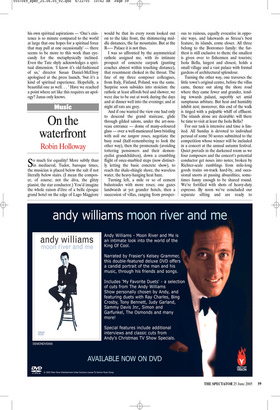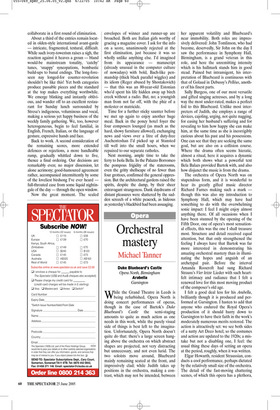On the waterfront
Robin Holloway
So much for equality! More subtly than in mediaeval, Tudor, baroque times, the musician is placed below the salt if not literally below stairs. (I mean the composer, of course; not the diva, the glitzy pianist, the star conductor.) You’d imagine the whole raison d’être of a belle époque grand hotel on the edge of Lago Maggiore would be that its every room looked out on to the lake front, the shimmering middle distances, the far mountains. But at the R–— Palace it is not thus.
I was so affronted by the asymmetrical rathole assigned me, with its intimate prospect of concrete carpark (panting coaches almost within touching distance), that resentment choked in the throat. The fate of my three composer colleagues, from Italy, Finland, Poland, was the same. Surprise soon subsides into stoicism: the rathole at least affords bed and shower, we were due to be out at work during the days and at dinner well into the evenings; and at night all rats are grey.
And if one wanted the view one had only to descend the grand staircase, glide through gilded salons, under the art-nouveau entrance — dome of many-coloured glass — over a well-manicured lawn bristling with noli me tangere roses, negotiate the busy road (half-remembering to look the other way), then the promenade (avoiding tottering pensioners and their demoncyclist grandchildren), down a crumbling flight of once-marbled steps (now distinctly letting the basic concrete show), to reach the shale-shingle shore, the waveless water, the heavy-hanging heat haze.
Turning left, a mile or so of cement balustrades with more roses; one gazes landwards at yet grander hotels, then a succession of villas, ranging from prosper ous to ruinous, equally evocative in opposite ways, and lakewards as Stresa’s best feature, its islands, come closer. All three belong to the Borromeo family: the furthest is still exclusive to them; the smallest is given over to fishermen and tourists; Isola Bella, largest and closest, holds a small village and a vast palace with formal gardens of architectural splendour.
Turning the other way, one traverses the little town’s original centre, before the villas came, thence out along the shore road where they came fewer and grander, tending towards palazzi, superbly set amid sumptuous arbiture. But heat and humidity inhibit zest; moreover, this end of the walk is tinged with a palpable whiff of effluent. The islands alone are desirable: will there be time to visit at least the Isola Bella?
For our task is intensive and time is limited. All Sunday is devoted to individual perusal of some 50 scores submitted to the competition whose winner will be included in a concert at the annual autumn festival. Quiet prevails in the darkened room as we four composers and the concert’s potential conductor get noses into notes; broken by Richter-scale rumblings from mile-long goods trains on-track hard-by, and occasional snorts at passing absurdities, sometimes funny enough to be shared round. We’re fortified with shots of heavy-duty espresso. By noon we’ve concluded our separate sifting and are ready to collaborate in a first round of elimination.
About a third of the entries remain located in olden-style international avant-garde — intricate, fragmented, textural, difficult. While such ivory-towerism raises a sigh, the reaction against it heaves a groan — bland would-be mainstream tonality, ‘catchy’ tunes, ‘snappy’ syncopations, bombastic build-ups to banal endings. The long-foreseen nay longed-for counter-revolution shouldn’t be like this! Yet both categories produce passable pieces and the standard at the top makes everything worthwhile. We emerge blinking and instantly oblivious, and wander off to an excellent restaurant for Sunday lunch surrounded by Stresa’s indigenous, voluminous and vocal, making a serious yet happy business of the weekly family gathering. We, too, however heterogeneous, begin to feel familial, in English, French, Italian, or the language of gesture, expressive hands and face.
Back to work. A second consideration of the remaining scores, more extended defences or rejections, a more handleable rump, gradually whittled down to five, thence a final ordering. Our decisions are remarkably even; no major dissension, let alone acrimony; good-humoured agreement rather, accompanied intermittently by some of the loveliest birdsong I’ve ever heard full-throated ease from some liquid nightingale of the day — through the open window.
Now the great moment. The sealed envelopes of winner and runner-up are broached. Both are Italian girls worthy of gracing a magazine cover. I ask for the info on a score, unanimously rejected at the first elimination, just because it was so wholly unlike anything else. I’d imagined from its appearance — manuscript (already unusual in the computer culture of nowadays) with bold, Bach-like penmanship (thick black parallel wiggles) and its idiom (Reger abused by Shostakovich) — that this was an 80-year-old Estonian who’d spent his life hidden away up birch creek without a radio. But, no; a youngish man from not far off, with the phiz of a molester or matricide.
Time for a further sticky saunter before we met up again to enjoy another huge meal. Back in the poncy hotel foyer the four composers lounged (as much as the hard, showy furniture allowed), exchanging news and views over a litre of duty-free Auchentoshan I’d picked up at Stansted till well into the small hours, when we repaired to our separate ratholes.
Next morning, ample time to take the ferry to Isola Bella. In the Palazzo Borromeo the pompous frigidity of the staterooms, even the gritty shellscape of no fewer than four grottoes, confirmed the general oppression. But the architectural gardens raised the spirits, despite the damp, by their sheer extravagant strangeness. Dank daydreams of distant pleasures were shattered by the sudden screech of a white peacock, as hideous as yesterday’s blackbird had been assuaging.



































































 Previous page
Previous page